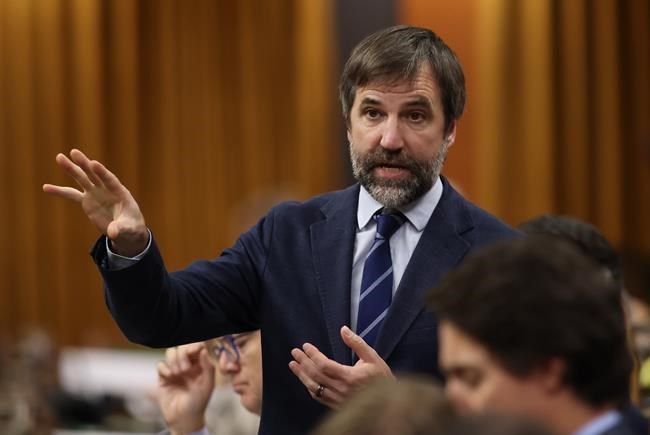OTTAWA — Regulations to cap greenhouse-gas emissions from oil and gas production will be published later this fall, and they won't be affected by a recent Supreme Court of Canada decision striking down parts of a federal environmental law, Environment Minister Steven Guilbeault said Tuesday.
The Liberals first promised during the 2021 election to cap emissions from the oil and gas sector and then ratchet them downward towards 2030, when Canada's next emissions target deadline hits.
The sector accounts for more than a quarter of Canada's total emissions, and Canada won't meet its target without a substantial decline in carbon emissions from pumping oil and gas out of the ground.
Canada's emissions plan has the sector cutting its total emissions almost in half by 2030.
Guilbeault said the government remains committed to the cap, and it shouldn't be affected by last week's court opinion labelling parts of the federal environmental assessment legislation as unconstitutional.
That decision said the Impact Assessment Act, which outlines how major projects like pipelines must be reviewed for environmental impacts, strayed into provincial jurisdiction at times by allowing Ottawa to make decisions about whether projects solely under provincial authority could proceed.
"I mean, obviously, we're looking very carefully at what the Supreme Court did," Guilbeault said.
"But people shouldn't forget that there was another Supreme Court decision, which was not an opinion, last year on carbon tax, which made it very clear that the federal government can act when it comes to climate change. And we can put a price on pollution, and that as a federal government we have jurisdiction to fight climate change."
The Supreme Court ruled in 2021 that the federal price on carbon was constitutional because greenhouse-gas emissions did not stop at provincial boundaries, giving them a national impact.
In the Impact Assessment Act decision, Chief Justice Richard Wagner did conclude that there are some provincial projects that could cause effects that fall in federal jurisdiction, which could give Ottawa authority to regulate or legislate them.
Based on the earlier decision on the carbon price, that would include greenhouse-gas emissions.
Guilbeault has tried very carefully to promote the oil and gas cap regulations as being about limiting emissions, not production. The latter is the exclusive jurisdiction of the provinces.
He has said that restricting emissions just means oil and gas companies must take actions that cut their own carbon footprint. It doesn't specify how they should do that.
But Alberta Premier Danielle Smith and some oil and gas companies have insisted that capping emissions will force a cut in production.
The Canadian Association of Petroleum Producers told Guilbeault in 2022 that both of the options for enforcing the cap would require producers to scale back how much oil they pump out.
Following the court decision last week, Saskatchewan Premier Scott Moe said the federal government should "rethink" its plan to overstep on oil and gas production and electricity generation.
The cap regulations are taking longer than Guilbeault hoped.
Last November, he said he expected the draft regulations would be ready by the spring. But they still haven't been published.
He attributed that to the complexity of the plan.
"There's no hold up," he said. "I mean, as far as I know, we're the only country in the world that are doing that. And we're the fourth largest oil and gas producer, so it's a pretty bold piece of regulation and we want to make sure that we get it as right as possible."
He said an appearance by the CEO of oilsands giant Suncor at a parliamentary committee Monday furthered the government's resolve that such regulations are necessary.
Guilbeault said nothing Rich Kruger told the natural resources committee made him feel more confident that the company would take steps on its own to reduce its carbon footprint and help slow climate change.
Kruger was at the committee to explain comments he made to shareholders in August about refocusing Suncor's priorities more on its core oil business and less on transitioning to lower-emitting fuels.
Guilbeault said those original comments underscored why the regulated emissions cap was needed, because companies like Suncor weren't going to do it on their own.
Kruger told the committee the company is committed to decarbonization but said it must continue to pursue further oil production to raise the money it needs to do that.
NDP MP Charlie Angus agreed with Guilbeault that Kruger sent a clear message.
"They have no intention of taking responsibility for the damage that they are doing to the planet and no intention of changing course," he said. "Even as our planet is on fire."
But Angus called out the government for taking so long to set the cap on emissions.
"This is Canada's Big Tobacco moment and our government, the Liberals, are missing in action," he said.
"It's been three years since this government promised that emissions cap. Where is it?"
This report by The Canadian Press was first published Oct. 17, 2023.
Mia Rabson, The Canadian Press



